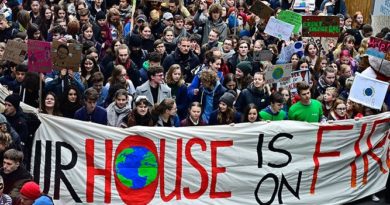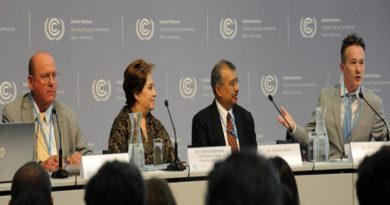SB 62 climate talks: Breakthrough as civil society’s Just Transition priorities were officially tabled
After two tense weeks of negotiations, one breakthrough emerged in the SB 62 climate talks: civil society’s Just Transition priorities were officially tabled in the UN climate process, thanks to relentless pressure from social movements, workers, and frontline communities. This vital step opens the door in the fight for transitions that put people first – ensuring climate action centres justice, dignity, and decent work, rather than enabling corporate greenwashing or elite control.
But beyond this opening, Bonn laid bare a system in crisis.
Even as NATO leaders just 200km away pledged more than US$1 trillion a year in additional military spending, rich polluting countries showed up at the climate talks pleading poverty. The silence on war, genocide, and rising global inequality was deafening.
Despite the escalating toll of climate impacts and injustice, these talks revealed a growing chasm between the urgent demands of communities on the frontlines of climate breakdown and the hollow, evasive language of a process struggling to retain relevance.
Negotiations on adaptation were little more than a smokescreen. Developed nations dodged their financial obligations towards developing countries once again, and held the process hostage, preventing progress.
The ghost of Baku haunted the talks, with developing countries facing fierce pushback when they united in their demand for a formal agenda item on the provision of climate finance by developed countries. And it’s clear the so-called ‘Baku to Belém’ roadmap remains riddled with holes. Without new, additional and grant-based public finance from historical emitters, there will be no money to fund a real Just Transition, no closing of the ambition gap, and no hope of holding the line at 1.5°C. The COP30 Presidency and all parties must put a plan in place to address the critical issue of the provision of climate finance, or risk a blow up.
As countries belatedly prepare their new climate action plans (Nationally Determined Contributions), one thing is clear: they will fall far short of what is needed. Despite this, there was a resounding silence around the ambition gap that is so clearly emerging. Countries that hold historic responsibility for the climate crisis continue to expand oil and gas exploration while pushing developing countries to shoulder the burden they themselves refuse to bear – both in cutting emissions and providing climate finance. It’s a double standard that deepens injustice and delays real action.
Tasneem Essop, Executive Director of Climate Action Network International, said: “Enough is enough. While bombs get billions and polluters are increasing their record profits, Bonn has once again exposed a system rigged to protect polluters and profiteers – complicit in a global order that funds destruction but balks at paying for survival.
“But even in this broken space, people’s power shone through. Due to the relentless pressure from civil society, the Just Transition fight finally made it into the formal process, laying the table for a win for workers, for communities, and for every person fighting to build a future rooted in dignity and hope. Decision-makers must come to Belém with the commitment to make this a reality.
“As this process drifts further from the real world, it is grassroots movements that continue to lead the way – resisting delay, greenwashing, and false solutions with vision, urgency, and courage. From the streets of Bonn to the heart of Belém, the fight for climate justice is turning into a roar that cannot be ignored.”
Caroline Brouillette, Executive Director, Climate Action Network Canada: “The world is facing a treacherous moment. Political headwinds and unfair economic rules are preventing the level of climate action we need. The UNFCCC feels increasingly disconnected from the real world.
“Amidst the dark clouds of these existential challenges to the planet and to this process, there is a ray of sunshine: parties are finding common ground around a Just Transition. The text forwarded to Belem offers us a fighting chance to a COP30 outcome that truly connects workers, communities and Peoples with the Paris Agreement.”
Amiera Sawas, Head of Research & Policy, Fossil Fuel Non-Proliferation Treaty Initiative: “As the Northern hemisphere suffers deadly heatwaves, UN climate talks remain frozen in an out-of-touch process. War and military spending escalated outside, while inside there was no discussion—and no finance. Civil society fought to bring negotiations into the real world, but geopolitics and the fossil fuel lobby kept derailing progress. Even successes, like the draft text for the ‘Just Transition Work Programme’ informed by workers and Indigenous Peoples, were nearly paralyzed by fossil fuel interests at the end. We are already at risk of breaching the 1.5 temperature limit, there’s no time for paralysis. There’s a real risk that the UN climate talks fail to address the crisis’s biggest drivers: coal, oil, and gas. We cannot afford any more failure, we must urgently do better. And we will – whether inside or outside the UN. Brazil is talking big but its actions speak louder than words and its recent approval of new oil extraction in the Amazon is the worst possible signal.”
Stela Herschmann, Climate Policy Specialist for Observatório do Clima (Brazil): “This is a party-driven process. What the Bonn meeting showed us is that the parties want to discuss public finance. Despite Brazil’s best intentions to streamline the agenda and make progress on other issues, it may not be possible to do so without including a conversation about public finance in the official COP30 agenda.
“Brazil had three priorities for Bonn. One of them, Just Transition, saw good progress and produced a preparatory text with key asks from civil society organizations so this work program can actually deliver justice to the people. The other two resemble Baku. The text on indicators for the global goal of adaptation advanced well but is being held until the last minute due to the discussion around finance and means of implementation. The UAE dialogue on the implementation of the Global Stocktake, did not progress as much. We will leave Bonn with two similar documents because the parties could not agree on a single informal note, and we can expect to see the same disputes over the scope and modalities in Belém.”
Mariana Paoli, Global Advocacy Lead, Christian Aid: “The Bonn climate talks have shown that there’s hangover from the chaotic ending at COP29 in Baku. Finance remains the elephant in the room. While negotiators circled around the issue in Boon , limited progress was made. We cannot afford another year of delay – COP30 must deliver where COP29 fell short.
“There has been an over reliance on the illusion that private finance will solve the climate crisis. Its growing presence in these spaces is starting to resemble a Trojan horse. Public grants based finance is essential to deliver climate action, decisions should be done based on the needs of communities and not profits and should be rooted in fairness and science.”
Teresa Anderson, ActionAid International: “Rich countries’ continued refusal to put real climate finance on the table means that climate talks are facing uncertain times. For once, however, it’s not all bad news. Governments are starting to get excited about Just Transition, and shaping energy and food systems in a way that really works for workers, women, farmers and communities. This comes at such a critical time, amid so much economic uncertainty, when many people feel they are being forced to choose between their immediate needs and a climate safe future. If approved at COP30, the Just Transition mechanism will deliver action on the ground, requiring and supporting governments to put people’s needs first and foremost at the start of every climate plan. This represents a major evolution in climate action, and the spark of hope that our planet urgently needs.”



